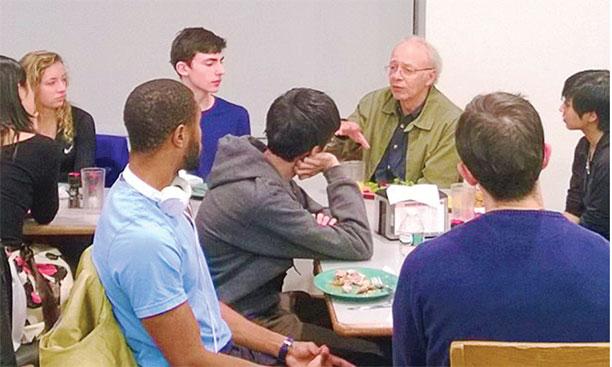
Vigorous argument is the lifeblood of learning and scholarship. For that reason, I agree emphatically with a statement adopted by our faculty in 2015 that reaffirmed Princeton’s commitment to guarantee “all members of the University community the broadest possible latitude to speak, write, listen, challenge, and learn.” This freedom extends to the expression of ideas that may be “unwelcome, disagreeable, or even deeply offensive.”
Many people worry about the state of campus speech today, and understandably so. Higher education has been embarrassed by appalling incidents such as the one at Middlebury College, where protestors shouted down Charles Murray and some physically assaulted him and his host, Professor Allison Stanger. Princeton’s own Professor Peter Singer was interrupted repeatedly when he tried to speak with an audience at the University of Victoria in Canada.
If one were to judge by media reports, one might assume that the events at Middlebury or Victoria were windows into the prevailing attitudes of college students today. I think that is quite wrong, on college campuses generally and at Princeton in particular. Disruptions are widely reported; civil discussions and peaceful protests are not.
Few people beyond our campus noticed, for example, when the Princeton Tory, the Princeton College Republicans, and the American Whig-Cliosophic Society co-hosted a speech by former Senator Rick Santorum on April 18. More than 100 Princeton students attended. Santorum spoke for about 30 minutes. Our students then asked sharp, tough questions, and Santorum defended his position vigorously.
When the event ended, Santorum thanked Princeton’s students for being “very polite” and “respectful.” “This is what should happen on college campuses,” he said. Students responded with applause. Santorum then added, “I don’t agree with you on some things, you don’t agree with me on some things. Hopefully you learned some things, I learned some things. That’s good: it’s iron sharpening iron.”
My conversations with Princeton students convince me that most of them appreciate and respect the importance of free speech to an academic community. To be sure, a few students have told me they would like the University to suppress views they find offensive, but the vast majority of students with whom I have spoken value Princeton’s fundamental commitments both to free speech and to inclusivity. They seek not to avoid vigorous argument, but to practice it while also showing respect for each other, especially for fellow students who are personally affected by claims about topics such as gay marriage, immigration, racial equality, or religious freedom.
It is especially challenging for campuses to find ways to respond appropriately to speakers like Milo Yiannopoulos who seem deliberately to incite audiences or offend listeners. Even such professional provocateurs have a right to state their views without censorship—but protecting that right can be difficult, particularly when they attract or bring outsiders spoiling for a fight.
When a controversial speaker comes to campus, members of the community have several acceptable choices about how to respond: they may attend the event and try to question the speaker; they may simply stay away from the event; they may criticize the decision to invite the speaker; or they may protest the speech without disrupting it. So long as the speaker is allowed to proceed and be heard, all of these options are consistent with the requirements of free speech: a peaceful protest is an exercise of free speech, not a renunciation of it.
Some students and faculty protested quietly when Charles Murray spoke at Princeton a little more than two months before his Middlebury appearance. As the lecture began, a group of students and faculty walked out silently to indicate their opposition to his work. The response to the protest on campus was mixed: some people argued that it would have been better if the protestors had listened to Murray’s lecture and challenged his views.
Challenges to decisions to invite speakers come from both ends of the political spectrum. For example, in 2014, when Princeton’s Department of English sponsored a lecture by Richard Falk, an emeritus professor and vehement critic of Israel, the Wall Street Journal published an editorial condemning the selection of Falk as a cause for “shame” and urging academia to “shun” the controversial speaker.
I respect the choices made by those who peacefully protest or criticize the selection of a speaker whose views they find offensive, provided they do not attempt to disrupt or suppress the speech. Peaceful protest that respects the right of others to listen or engage is not an interference with free speech; on the contrary, it is itself an exercise of free speech.
I am glad, however, when I witness events where students, faculty, and outside speakers engage vigorously but civilly across political and ideological lines. Those interactions can require courage, but they also generate the kinds of opportunities for learning we aim to provide. They are, as Rick Santorum said, an essential part of “what should happen on college campuses.”
